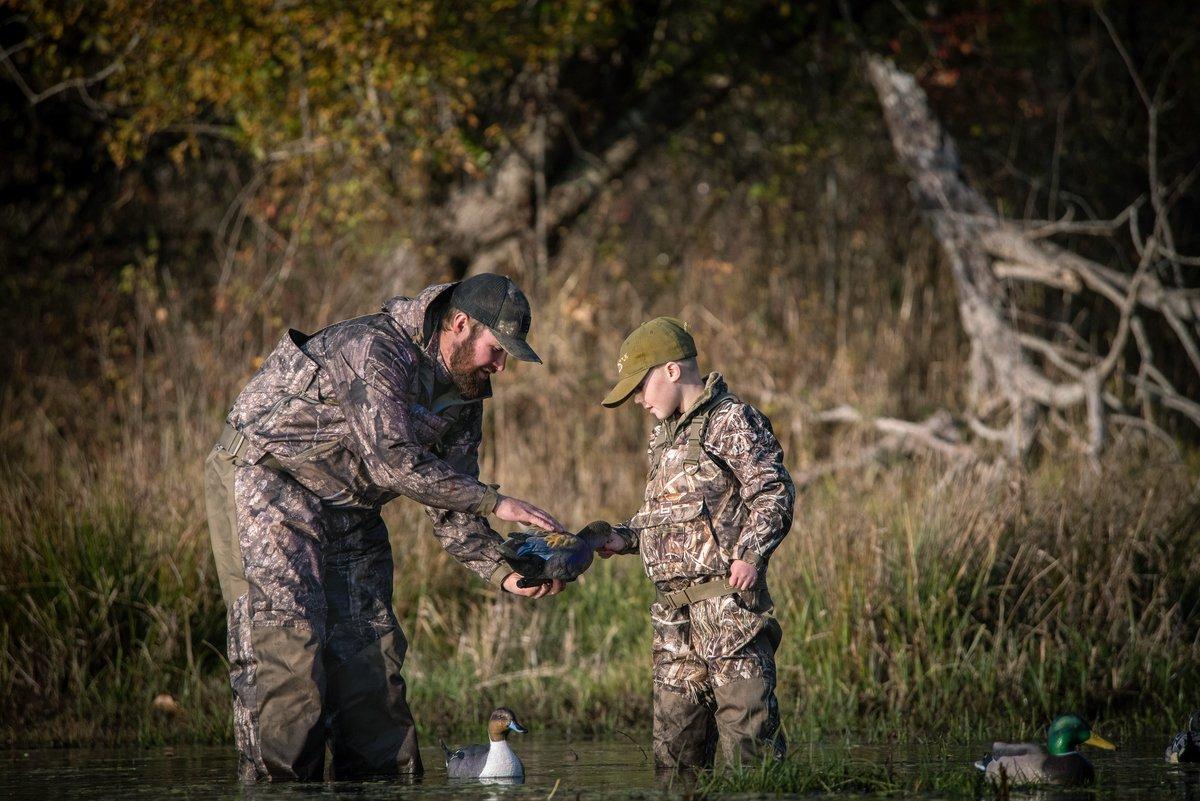Learn how to hook a new hunter on waterfowling. Hint: It's about more than shooting ducks
Blessed is the waterfowl hunter who taketh a child duck hunting, for that waterfowler shall inherit the earth — or at least get a primo spot in that final duck blind in the sky.
Or at least I'm pretty sure that's how the passage goes. Taking a young hunter (or any new hunter) on their first duck hunt is biblically important in today's world. Young and new hunters are the future of hunting and conservation funding.
But do we really know how to conduct youth-focused hunts correctly to assure new hunters want to go again? The first hunt is especially important, but every early outing is critical. Shooting a duck isn't the main focus. An order of priorities might be to have fun, spark excitement, have them learn from the experience and, finally, get a duck.
Here are 10 rules for getting there. Thou shalt:
Hold a Pre-Hunt Practice Shoot
Young hunters and other first-time shooters need a practice session or two to get familiar with the shotgun they'll use. A dark blind isn't the place to teach someone how to load the shotgun, show them where the safety is or deliver a primer on how to swing on and lead a duck. That's best done at leisure before a hunt. Practice sessions also boost the confidence of young hunters and increase their chances of shooting a duck.
Have a Clear, Simple Safety Talk
Maybe your charge has taken hunter's safety. However, some states allow mentored hunts before newbies complete a class. Either way, duck hunting is unique, so it's essential to hold a waterfowling-specific safety talk first. Discuss where to point the muzzle when action isn't imminent, and define zones of fire for safety and etiquette. Give the new shooter confidence: Here's where you don't shoot, here's where you do. Then make sure to follow your own rules in the blind. That sets them up for success.
Make Sure the New Hunter is Outfitted Properly
Arrange for the young hunter to be properly clothed for the conditions. Huge old coats can hamper comfort and success, and when the weather is bad, shoddy gear makes a hunt miserable. Make this part easier for both of you, and choose hunting days carefully. Avoid horrible weather that could easily turn a young hunter off.. It's better to wait for a good day. Consider waders and footwear, too.
Bring Snacks and Water
Packing plenty to eat and drink — and mostly healthy stuff, not just greasy chips and candy — helps a young hunter stay happy. Encourage and allow your charges to eat and drink (especially water, to keep them hydrated). Make sure breakfast is available, even if it's a reward after the hunt. A thermos of hot chocolate can be a savior.
Turn Off Electronic Devices in the Blind
New hunters — especially children — will want to keep that phone on and turn to it for entertainment during lulls. Don't allow it. It's okay to bring cell phones for emergencies and, of course, photos, but keep them zipped away when the birds are flying. Blame the bright screen as a duck-flaring culprit if you must, engage them in conversation between flights and follow this rule yourself.
Ask New Hunters to Participate in All Hunt Activities
You're not a hunting guide. You're a mentor. Young or new hunters crave to be a part of everything, so let them. They can help load gear, launch the boat, haul a canoe to the water, lug gear and toss out decoys. Assign setup and takedown tasks, and be as specific as possible. And when hunting, put a duck call in their hands, and have them work it. The ducks won't care.
Coach and Call Shots
Be a gentle but clear and encouraging coach when calling shots. Whisper to the new hunter about what's happening. Agree beforehand on a shooting command — Take 'em, perhaps — for the moment of truth.
Leave Your Shotgun Behind
This won't be an issue with special youth hunts. But if you're hunting during a general season with a new hunter, consider leaving your shotgun behind on the first outing. Concentrate on your mentee. You've had many mornings in the duck marsh and will experience more. Give this one to the newcomer.
Quit Soon After Requested
Young hunters especially will have a limited attention span. And you know well that flights slow down. Still, there's always another flurry of action just when you think it's done for the morning. Most young hunters will last longer than you think if you've done things right. But don't drag it out too long if they say they want to quit. Fifteen minutes more or something similar is fine. They just want to know there's an end in sight. And stick to your promise.
Get Participation When Cleaning Game
Involve your new hunter in cleaning game. This process is essential for young hunters, and the meat is a special hook for many new adult hunters. Most new hunters want to be involved in dressing ducks for consumption, and those that don't have to learn it goes with the territory. Plus, you might find a new pluckmaster.
Bonus: Celebrate the Habitat, Game and Hunt
If you follow these rules, you'll set yourself — and your new hunting buddy — up for success. Just remember that it's not always about the hunt. Take time to talk about the wonders of everything around you, not just how many ducks you can kill. Discuss the duck species you might see and their life histories. Talk about habitat and how ducks use it. Admire the sunrise, a cloud bank, circling pelicans, a marsh hawk sailing along and the chirp of a muskrat. There's no end to the other reasons we hunt. Things might be old hat to you but not to a newbie.
Click here for more Realtree waterfowl hunting content. And check us out on Facebook.








